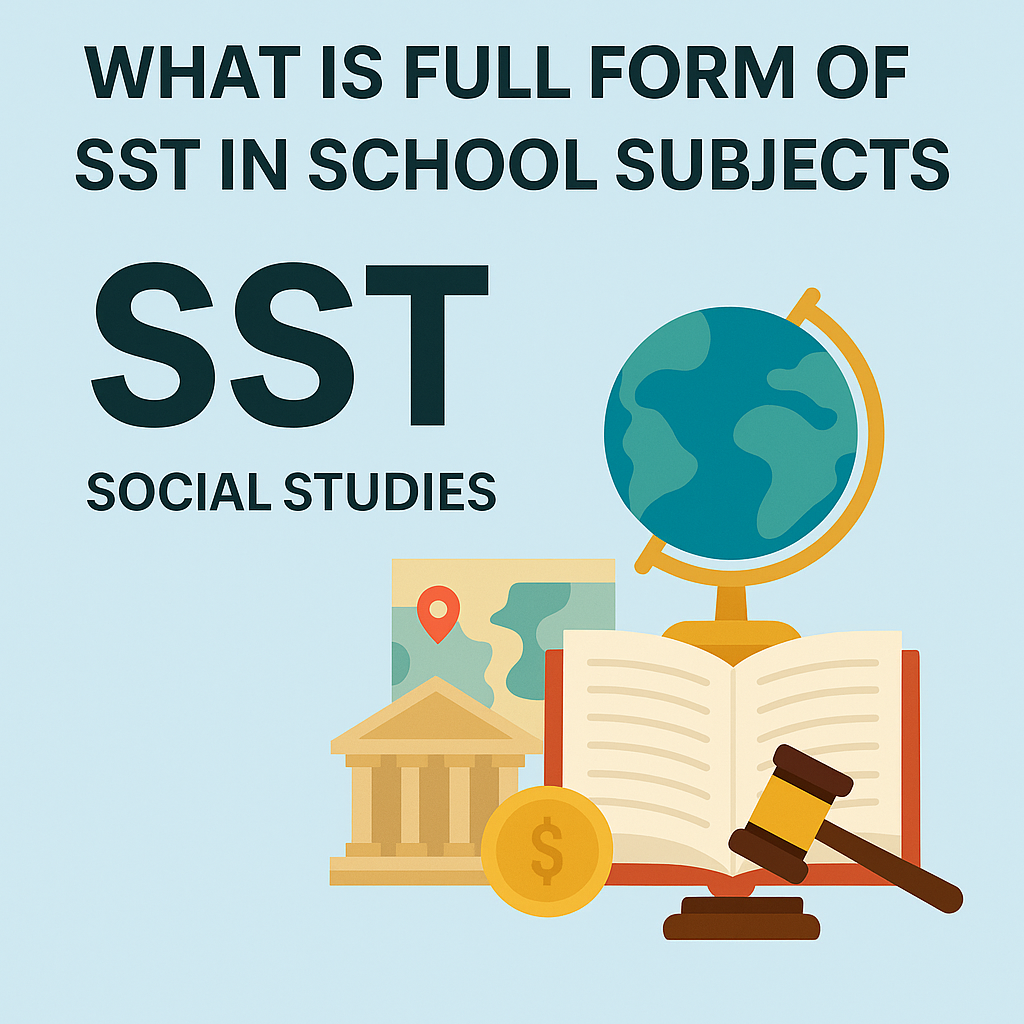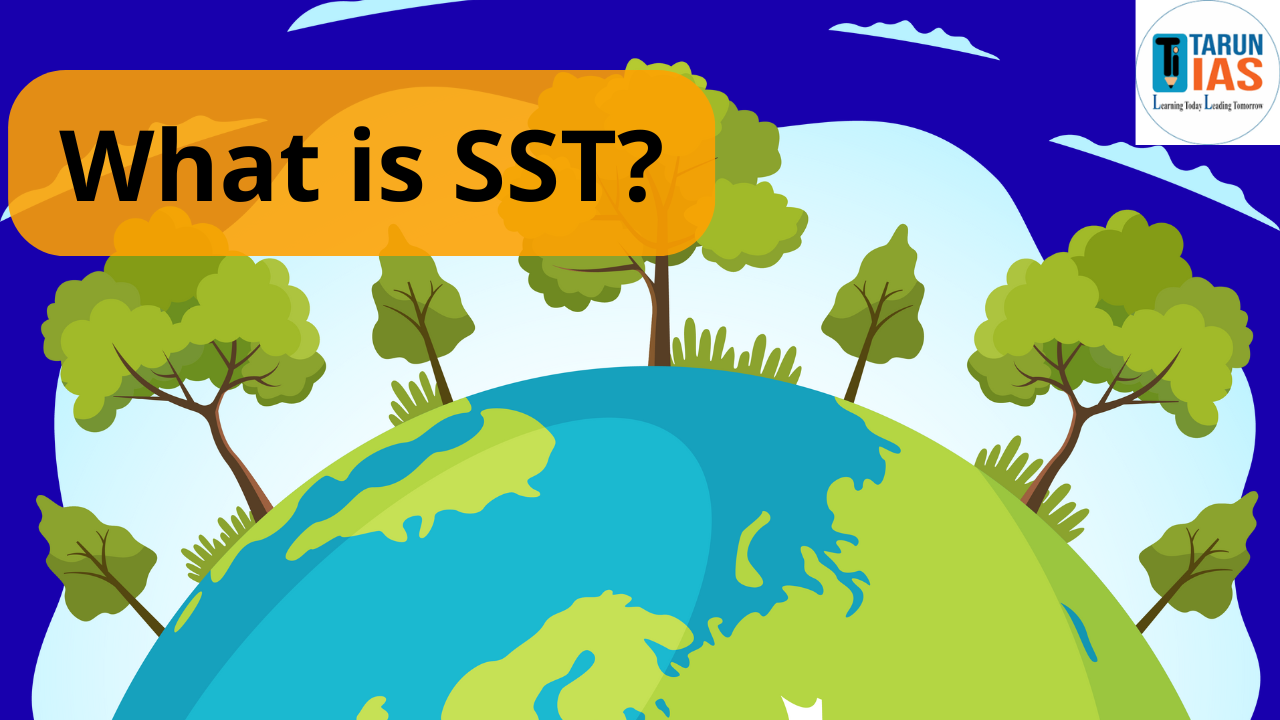Social Studies, or SST, is a subject that helps us learn about the world we live in. It teaches us about kings and freedom fighters, maps and places, how the government works, money matters, and different cultures. It’s like a storybook of our past, present, and society!
What is SST?
Social Studies holds a very important place in the school education system of India. It helps young minds build an understanding of the world they live in.how societies function, how people govern themselves, and how history, geography, and economics shape our lives. Learning SST goes far beyond just scoring in exams.it shapes a student’s thinking and awareness about their country and the wider world.
- Encourages awareness of culture and society
- Sharpens thinking and decision-making skills
- Builds a strong base of general knowledge useful for future careers

What is Full Form of SST in School Subjects?
SST full form is Social Studies or Social Science, and it holds a vital place in the Indian school system. Taught mainly from classes 6 to 10, SST helps students build a strong understanding of subjects like history, geography, civics, and economics. It is a subject that prepares students not only for board exams but also for understanding how the world around them works.
Also Read: EVS
What are the Topics Covered in Social Studies?
Social Studies is a broad subject that helps students understand the world around them from the past to the present, from geography to governance. Here’s a quick look at the main components commonly taught in schools:
| subjects | Topic covered |
| History | Focuses on past events, ancient civilizations, and key historical personalities. |
| Geography | Covers Earth’s physical features, climates, and the relationship between people and their environment. |
| Civics / Political Science | Teaches about government structures, laws, the Constitution, and responsibilities of citizens. |
| Economics | Introduces concepts of trade, financial resources, production, and money management. |
| Culture & Society | Explores customs, festivals, religions, languages, and everyday life of various communities. |
What is the SST Importance?
SST is an integrated subject that includes four main streams: history, geography, civics, and economics. From class 6 to 10, it is taught as a core subject in both CBSE and ICSE boards. It not only helps students do well in board exams but also builds a solid foundation for higher education in social sciences and humanities.
- Covers multiple subjects under one umbrella
- Plays a major role in class 10 board exams
- Prepares students for careers in law, civil services, and teaching
What is SST Relevancy in School Subjects?
SST is not just a subject. It’s a way to understand the real world. It connects students with what’s happening in society and teaches them to think about current issues in a responsible way. Whether it’s an entrance exam, quiz competition, or group discussion, students with good SST knowledge often perform better.
- Builds understanding of Indian and world affairs
- Supports preparation for entrance exams and scholarships
- Instills moral values and social responsibility
Why is SST a Compulsory Subject?
In both CBSE and ICSE and also other state boards, SST is a compulsory subject until class 10. The subject includes written exams and internal assessments through projects and presentations, helping students apply what they learn. It also opens doors to choosing Humanities or Arts in higher classes.
- Required for all students till 10th grade
- Includes both theory and project-based learning
- Builds groundwork for subjects like history, political science, and economics in classes 11–12
What is SST Other Meaning?
Though SST in schools means Social Studies, it has other meanings in different fields:
- Serum Separator Tube (Medical): A test tube used to collect and separate blood samples.
- Sea Surface Temperature (Geography): Refers to the temperature at the surface of oceans, useful for weather and climate studies.
Why SST Matters?
Social Studies shapes how we think about the world, our place in it, and how we interact with others. It teaches us about our past, helps us understand current issues, and prepares us for the future. Every student who takes SST seriously becomes not only a better learner but also a more aware and responsible citizen.
Conclusion
SST is more than just a subject. It is a guide to life. It helps students understand their rights and duties, how the world works, and how to think critically. For students aiming to grow into informed individuals or future leaders, SST is a key stepping stone.
SST full form FAQs
What is the full form of SST in school subjects?
The full form of SST in school subjects is Social Studies or Social Science. It is a compulsory subject taught from classes 6 to 10 in most Indian school boards like CBSE, ICSE, and state boards. SST includes key topics such as history, geography, civics, economics, and culture to help students understand the world around them.
Why is SST important in school education?
SST is important because it helps students understand how society functions, how governments work, and how history and geography have shaped the present. It builds general awareness, critical thinking, and decision-making skills. It also lays the foundation for careers in civil services, law, teaching, and humanities.
What topics are covered under SST in schools?
Social Studies includes several interconnected subjects:
- History: Ancient civilizations, freedom movements, historical events
- Geography: Earth’s features, environment, maps, and climate
- Civics: Constitution, government, laws, and citizenship
- Economics: Trade, money, resources, and financial literacy
- Culture & Society: Festivals, traditions, and social values
Is SST a compulsory subject in Indian schools?
Yes, SST is a compulsory subject till Class 10 in all major Indian education boards, including CBSE and ICSE. Students are assessed through written exams, projects, and internal assessments. After Class 10, it becomes optional as part of the Arts or Humanities stream.
How does SST help students in the future?
SST helps students become socially aware, responsible citizens. It enhances their general knowledge, boosts their performance in competitive exams, and prepares them for higher studies in political science, history, geography, or public administration. It also improves public speaking, debate, and analytical skills.















